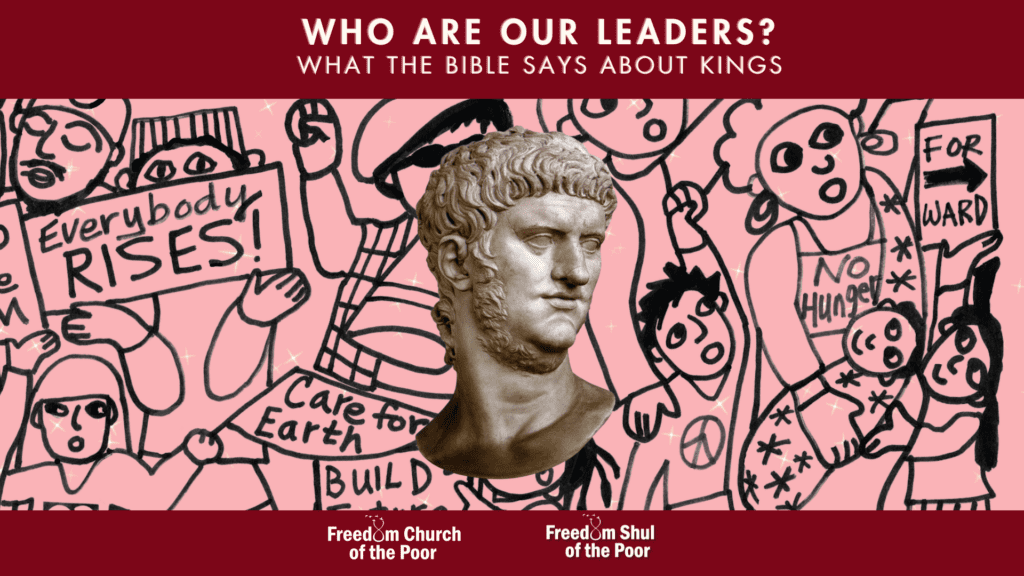
The God of the Hebrew Bible is a God who is found, and whose will is revealed and served, in the struggle of poor and oppressed people to overthrow the unjust kingdoms of landlords and creditors. This God is one who accompanies and guides poor and oppressed people as palaces and temples are torn down, and as the armies of the rich and powerful are cast down to the bottom of the sea. Again and again, this God calls prophets to denounce and undermine kingdoms of exploitation – of hoarded wealth and organized brutality. This God doesn’t dwell in luxurious temples, but alongside the movements of the outcast and discarded, the debtors and the impoverished, as they struggle to remake the whole of society into a home humane enough to allow the divine presence within it.
This Bible study series traces that experience of God as it finds expression in the books of the Hebrew Bible that deal most closely with the emergence of the revolutionary Israelite movement, the reaction and counter-revolution of the Israelite kingdoms, and the determined opposition of the early prophets. The focus is especially on Exodus, 1 & 2 Samuel, 1 & 2 Kings, and the prophets of the 8th century BCE (Amos, Micah, Isaiah, and Hosea).
The study group met throughout the Fall of 2024, during the height of the US presidential election, and this resource guide is being published in January 2025, just before the second inauguration of Donald Trump as president of the United States. This meant that as we were studying the Bible, and studying its ancient historical context, we were also of necessity studying our own economic and political realities today.
The struggle at the heart of the Biblical stories we were reading was over the question of who would dictate society’s priorities: landlords, creditors, bureaucrats, and generals; or communities of farmers, shepherds, and manual laborers. The struggle waged by the ancient prophetic movements against the monarchies of Israel and Judah was over the basic question of how land and labor and the earth’s abundance would be used: to feed and clothe and house and care for people, or to build palaces and temples, mansions and military garrisons for the elite. It was a struggle between forces in society with fundamentally different ideas of where God dwells, and whose side God is on: Does God bless injustice, and the hoarding of wealth, and dispossession, and narrow nationalistic militarism? Or does God command us to break every yoke of oppression, and care for one another, and give special concern to the poorest among us?
The struggle today is over similar questions: will society be led – and led to its destruction – by financiers, energy executives, speculators, war-mongers, and tech magnates, or will it be saved by the world’s poor and increasingly economically outcast majority?
Kings of old and new, especially in times of profound crisis, have often put forward the most barefaced, self-serving, and extremist answers to these kinds of questions. Blasphemously, they claim divine support today for their plans to make the rich richer and to grind the faces of the poor into the dirt by attacking wages and health care, by making being poor a crime, along with waging political struggle, by carrying out mass deportations, and by denying the rights and the very existence of LGBTQ+ people. They claim a divine mandate to drive the nation and the planet onward into the catastrophes of climate crisis and world war.
The sacred texts highlighted in this study series expose the reality that these plans and policies – many of which have been pursued by Republicans and Democrats alike – are entirely contrary to God’s will and God’s teaching as laid out in the Bible. This is not the way laid out for us by the God who led the Israelites out of bondage, the God who called Elijah and Elisha, Isaiah, Micah and Amos. That God demands that we free those who are in chains, rather than fastening them more tightly.
As a new king is anointed in Washington, D.C. to reign over a society groaning under the weight of its own injustices, these stories from the Hebrew Bible provide us with comfort, and the confidence that comes with connecting ourselves to a legacy of struggle that stretches back over thousands of years. But they also provide us with warnings – we can lose, and we can fail. They provide us with a breadth of moral and political vision: we are not fighting against one individual, or political party, but against an entire edifice of injustice that has to be dismantled and reconstructed on new foundations. And they provide us with instruction and guidance on how to organize ourselves, on where and how to build power and strength, on where to find God and how to walk with God toward freedom.
Daniel Jones, Freedom Shul of the Poor